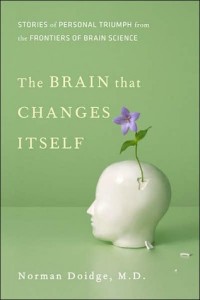 A fellow professional recommended this book to me a few years ago, and I finally go around to reading it (well, listening to the audiobook). Although a few years old, the findings and implications are still very relevant today. It is similar to Train Your Mind, Change Your Brain by Sharon Begley, which I blogged about some time back. Like Begley, Dr. Doidge explores some of the history of neuroscience and how the scientific community gradually came to embrace the idea of neuorplasticity. At one time, most neuroscientists believed that the brain didn’t change much after a certain age and was pretty static by adulthood. But now it is clear that the brain is remarkably adaptive (or “plastic”) – much more so than scientists dared to imagine even as recently as 20 years ago. Doidge provides a number of accounts of people who were able to overcome various disabilities through neurorehabilitation and cognitive training that are quite inspiring.
A fellow professional recommended this book to me a few years ago, and I finally go around to reading it (well, listening to the audiobook). Although a few years old, the findings and implications are still very relevant today. It is similar to Train Your Mind, Change Your Brain by Sharon Begley, which I blogged about some time back. Like Begley, Dr. Doidge explores some of the history of neuroscience and how the scientific community gradually came to embrace the idea of neuorplasticity. At one time, most neuroscientists believed that the brain didn’t change much after a certain age and was pretty static by adulthood. But now it is clear that the brain is remarkably adaptive (or “plastic”) – much more so than scientists dared to imagine even as recently as 20 years ago. Doidge provides a number of accounts of people who were able to overcome various disabilities through neurorehabilitation and cognitive training that are quite inspiring.
As it turns out, the analogy that the brain is much like a muscle really is fitting. With intense training and practice, the brain forms new and robust synaptic connections that allow us to meet new challenges. Our usual tendency is to avoid our weak areas. Unfortunately, this tendency undermines the adaptation process. For our brains to grow and change, we must deliberately focus our attention…to seek stimuli that provide the “exercise” that our brains need for neuronal growth to occur.
Doidge makes the science both accessible and interesting. You might find that his book inspires you to challenge yourself in new ways knowing that neuroplasticity is on your side. My one caveat about this book is that, in describing some of the neuroscience research, Doidge details a number of animal studies, particularly primate studies, that I found emotionally unsettling. I’m don’t have a rigid view on animal research. I realize that some of these studies on animals lead to findings that can alleviate human suffering and save lives. I get that. However, I still find myself feeling pretty sad for the animals that are sacrificed to advance our scientific knowledge. So, if you would find reading about some of these animal studies upsetting, then this might not be the best book for you.
